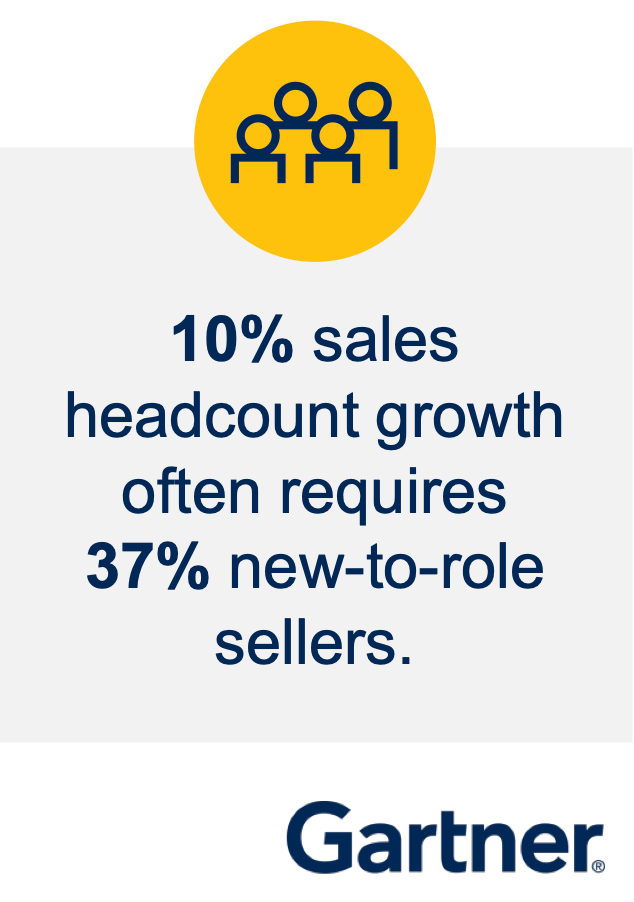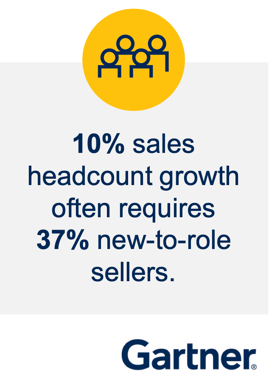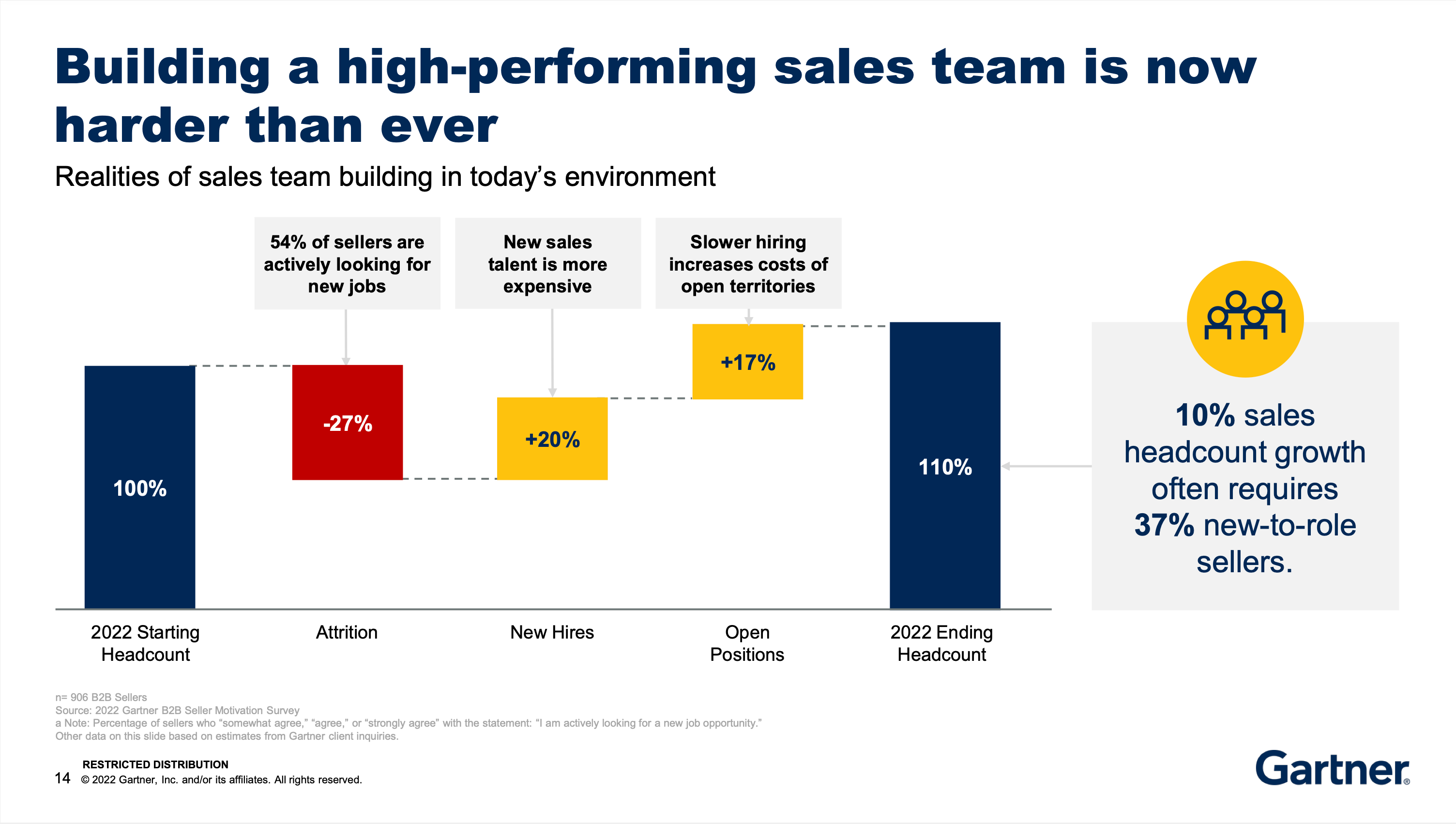Gartner: Building a high-performing sales team is now harder than ever!
November 22, 2022

 Gartner’s latest guidance for Chief Sales Officers [Leadership Vision 2023: 3 strategic actions for success] contains a conclusion that I believe every sales leader will recognize: retaining and building a high-performing sales team is harder than ever.
Gartner’s latest guidance for Chief Sales Officers [Leadership Vision 2023: 3 strategic actions for success] contains a conclusion that I believe every sales leader will recognize: retaining and building a high-performing sales team is harder than ever.
The challenging economic climate and the increasing expectations of B2B buyers means that mediocre salespeople who lack the necessary attitudes, behaviors and competencies will struggle even more than they might previously have done to win business.
Gartner’s research shows that hiring is taking longer, retaining talent is becoming harder, and new hires are more expensive. They have found that achieving a 10% sales headcount growth often requires 37% new-to-role sellers. In this challenging climate, I believe that great sales organizations will become stronger and weak sales organizations will become weaker, and the gap between these two groups will widen.
No sales leader or CEO wants to be trapped on the weaker side of this growing divide...
The war for talent means that top-performing salespeople with winning attitudes, behaviors and competencies that can also demonstrate a track record of proven (rather than accidental) personal success are in very high demand. They will be motivated to stay with top employers that have strong a strong market position, and they will move on from less good employers with weak market positions.

Having confidence in their continued personal and financial success means more to these top sales performers than seemingly attractive headline on-target earnings they know they will struggle to achieve. This affects both companies trying to hire andcompanies trying to retain.
So the first message is - if you’re trying to hire or retain the best salespeople, you need to get your own house in order first: your offerings need to be competitive, your sales organization needs to be inspiring, your company needs to have a positive culture, and your marketing needs to be effective.
If any of these are weak, you are at high risk of losing your better people and will struggle to hire anyone who isn’t a second- or third-rate compromise (which will, of course only serve to accelerate the spiral of decline).
But let’s assume that your offerings are competitive, your sales organization is inspiring, your company has a positive culture, and your marketing is effective. How can you make the most of your existing sales staff, and ensure you hire the right people as you grow?
Making the most of your existing team
It’s best, for a number of reasons, to start by evaluating your existing team and assessing their attitudes, behaviors, and competencies. It’s very dangerous to rely simply on impressions - I believe it’s critically important to implement an evidence-based approach.
And whilst their results are an important indicator, there are many reasons why simply looking at their performance against quota and their other key sales metrics isn’t necessarily going to give the complete picture - some salespeople, for one reason or another, simply have easier assignments than others. This, by the way, is one reason why you cannot rely on an apparently successful sales candidate’s reported results in their CV - even if they are accurate!
This is where a dedicated sales assessment process - such as the one pioneered over many years by Objective Management Group - can be so helpful. OMG’s research-based approach deeply analyses 21 key predictors of sales performance, spanning attitudes, behaviors, and competencies and exploring both their will and their ability to sell.
This sort of assessment can not only highlight the key areas for improvement, it can also tell you whether you’ve got the right people in the right roles. And in an age where we are urged to invest more time in high-quality coaching, OMG’s assessments enable you to identify where your coaching will have the most powerful impact.
Making the right new hires
Assessing your existing salespeople and sales managers in this way can not only help you to maximize the potential of every existing member of your team, it can also help you to recognize the qualities you need to look for when making new sales hires.
I think we can all acknowledge that past performance does not always predict future results - particularly in a new environment - and recognize that some indifferent salespeople have somehow worked out how to come across really well at job interviews.
A candidate’s CV, although a useful starting place, is too often more remarkable for what it leaves out than what it contains. Slick interview skills don’t always accurately predict how effectively a candidate will interact with your customers. References can often be politely bland.
That’s why using an evidence-based assessment can be so powerful. But the general-purpose psychometric assessments promoted by many HR departments typically fail to uncover the sales-specific attributes that are so important in predicting sales success in your environment.
I’m thinking of factors that have been proven through years of research to correlate strongly with sales performance, such as being willing to accept personal accountability and responsibility, and being willing to say what the customer needs to hear rather than what they want to hear.
So - at what stage of the recruitment process should we introduce the assessment? I’d recommend doing it as soon as possible, for everyone who satisfies your basic criteria. Assessing early - prior to the interview process - allows you to quickly identify candidates with potential and to establish the specific topics that you will want to explore with each of them.
Are assessments worth the investment?
Allow me to share some statistics: 92% of candidates who were hired after being recommended by OMG’s assessment tool rose to the top half of their new sales force within 12 months, whilst 75% of the candidates who despite not being recommended were nevertheless hired failed within 6 months.
In the light of those facts, I’ll reverse my previous question, given that the costs and consequences of failure are so high: can you afford to NOT assess both your existing team and any potential new hires?
You can learn about OMG’s sales assessment criteria here: http://stats.objectivemanagement.com/498. And if you’d like to find out more, please book some time here: https://www.inflexion-point.com/book-a-call.
By the way: other sales assessments are available. But after comparing them all, I have no idea why you wouldn’t choose OMG’s.
About the Author
 Bob Apollo is a Fellow of the Association of Professional Sales, a founding contributor to the International Journal of Sales Transformation, a recognised Sales Futurist, an active member of the Sales Experts Channel, and the driving force behind Inflexion-Point Strategy Partners, the leading proponents of outcome-centric selling.
Bob Apollo is a Fellow of the Association of Professional Sales, a founding contributor to the International Journal of Sales Transformation, a recognised Sales Futurist, an active member of the Sales Experts Channel, and the driving force behind Inflexion-Point Strategy Partners, the leading proponents of outcome-centric selling.
Following a successful corporate career spanning start-ups, scale-ups and market leaders, Bob now works as a strategic advisor, mentor, trainer and coach to ambitious B2B sales organisations - teaching them how to differentiate themselves through their provably superior approach to achieving their customer's desired outcomes.


Comments